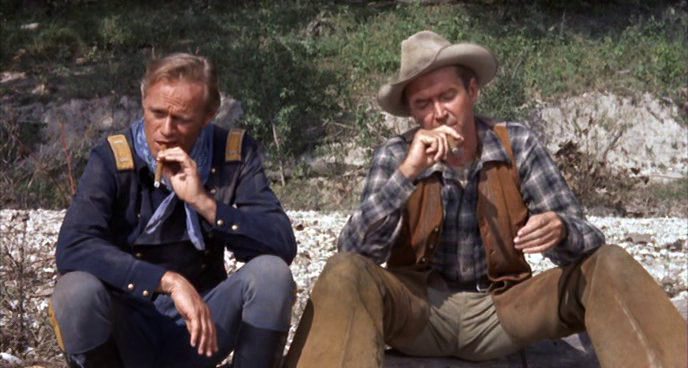Available on Dual-Format Blu-Ray/ DVD Mon 13 March 2017
Shiny-shoed marshal Jimmy Stewart has been hustled out of his comfortable life to help lead captive children out of Comanche bondage. Stewart’s not keen but is persuaded – to the disgust of those around him – by large dollar signs rather than simple humanity. Cavalry officer Richard Widmark persuades Stewart to help retrieve the children; all the while flirting with Shirley Jones whose eight-year-old brother was captured by a raiding party of Indians years earlier
In this strange tragicomedy there are shades of Ford’s two other great movies: the tragedy and disillusion of The Searchers (made five years before), and the knockabout of The Quiet Man. There’s a smartly-written script that’s excellently played throughout, especially in buddy scenes between Stewart and Widmark. One of the white men offers Stewart $1,000 to bring back any abducted white boy of the right age so he can be passed off as his son and help placate his hysterical wife. The skewed morals dictate that children captured years ago may have been ‘corrupted’ and be beyond repair. Now fully assimilated to ‘savage’ ways they’d be only too happy to scalp or rape any white settlers they come across.
The film comes from an age when being mixed-race was just about the worst thing anyone could be, and the premise has to be seen in the context of the era in which it was made. Stewart’s blood money and the cruel truth about grown-up abducted children has, mixed in, a story about Stewart trading rifles with Indian chief Quanah Parker. Stewart is playing against type and reveals an angry rage that he displayed rarely in his acting career.
It’s certainly true that countless thousands of Texans were captured, tortured and traded by the Comanche whose lands had been stolen by the white man. It’s not clear quite why John Ford was so inspired by these events. If Shirley Jones ever finds her now-grown-up brother there’s a 50/50 chance of him being either a savage degenerate who will bring shame on her family or someone who will recognise his sister and be rehabilitated.Sadly, very few movies – especially bearing in mind the number of Westerns that Hollywood made – look sympathetically on the Native Americans’ plight. By the 1960’s Ford’s Two Rode Togther seemed utterly out of step in the light of the Civil Rights movement. The film has long been accused of being a reheating of his unforgettable The Searchers, but this 1961 movie is complex and rewarding and holds up on many levels.
